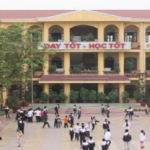The tasks mentioned in Official Dispatch 09 of the Steering Committee for the Arrangement of Administrative Units at All Levels and the Building of a Model for Local Government at Two Levels of the Government (the Government’s Steering Committee) are about temporary orientation in arranging personnel when arranging administrative units and organizing local governments at two levels.

Officials of Nghi Huong Ward (Vinh City, Nghe An Province) handle administrative procedures for citizens. (Photo: Nghe An Newspaper)
In the official dispatch, the Government’s Steering Committee assigns specific tasks to ministries and sectors.
For ministries managing industries and fields, the Government’s Steering Committee requests a review of legal documents and urgent guidance on functions, tasks, and powers according to industries and fields under their management for specialized agencies under the People’s Committees at provincial and communal levels, suitable for the model of local government at two levels, to be issued before June 15th.
At the same time, they should guide the determination of the number of employees in public non-business units in industries and fields under their management, in line with the orientation of arranging public non-business units at the communal level.
Regarding the Ministry of Home Affairs, the Government’s Steering Committee directs the completion of the draft Decree on the organization of specialized agencies under the People’s Committees at provincial and communal levels, providing a basis for localities to implement and promptly issue it so that the two-level local government can operate.
It is also necessary to perfect regulations on personnel management based on target management and promote decentralization and empowerment of local governments in managing and utilizing personnel.
The official dispatch clearly states the requirement for the Ministry of Home Affairs: “Coordinate with the Central Organization Commission in perfecting regulations on the framework of criteria for determining the personnel of agencies, organizations, and units in the political system and advising the Politburo on the total number of public employees for the 2026-2030 period, while managing personnel according to the Politburo’s regulations.”
For the People’s Committees of provinces and centrally-run cities, the Government’s Steering Committee orients that, for the time being, the number of officials and civil servants at the district and communal levels should be maintained and arranged to work at the new communal level.
At the same time, localities must review and streamline personnel in conjunction with restructuring to improve the quality of the team to meet the requirements of the task, ensuring that within five years, it will basically comply with the Government’s regulations.
The People’s Committees of provinces and centrally-run cities are requested to manage and allocate civil service personnel at the local governments at the communal level within the total personnel assigned by competent authorities, suitable for the arrangement of administrative units and the locality’s actual situation, ensuring balance among communes, meeting work requirements, and completing assigned tasks.
“Rethinking Provincial Mergers and County-Level Governance: Optimizing Educational and Healthcare Institutions”
The restructuring of local public service units is guided by a set of principles aimed at enhancing efficiency and effectiveness. These principles are designed to streamline operations, improve service delivery, and ensure optimal utilization of resources. The underlying objective is to create a more agile and responsive public service system that can cater to the diverse needs of its constituents.
“Provincial Mergers and the Elimination of District-Level Administration: Proposed Plans for the Reorganization of Schools, Hospitals, and Other Institutions Under the Municipal People’s Committee”
With the two-tier local government structure in place, the focus now shifts to optimizing the functioning of public service units. The government will task the Ministry of Home Affairs, in collaboration with relevant ministries, to formulate and propose amendments or new regulations governing the organization and operations of these units. These updated guidelines will ensure efficient and responsive public services that meet the needs and expectations of the people.
The Great Transformation: Elevating 7,200 Civil Servants to the Ranks of Civil Officers
“The Prime Minister has instructed the Ministry of Home Affairs to take charge and coordinate the review and approval process for converting 7,191 staff positions from public employees to civil servants. This initiative underscores the government’s commitment to strengthening the civil service and enhancing the efficiency of public administration.”



















